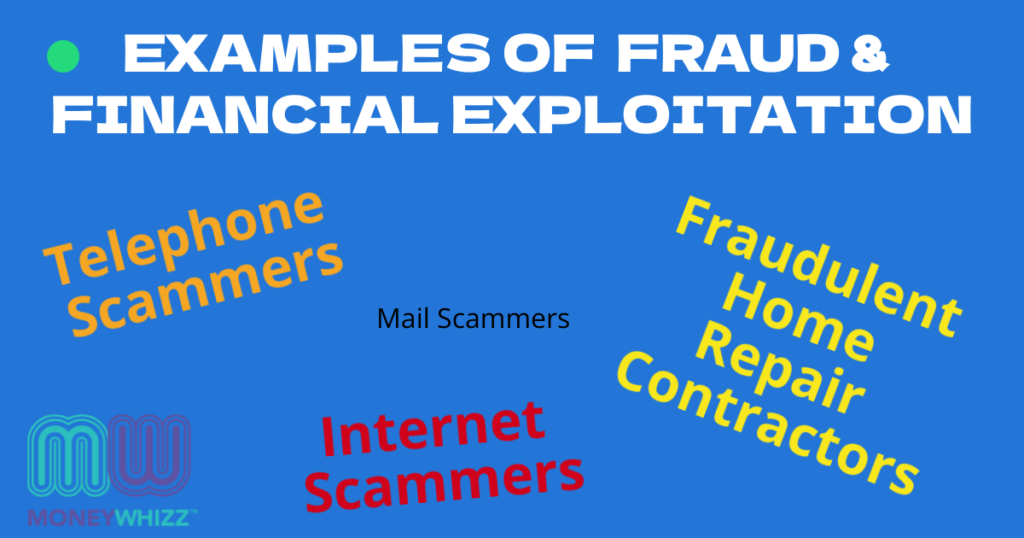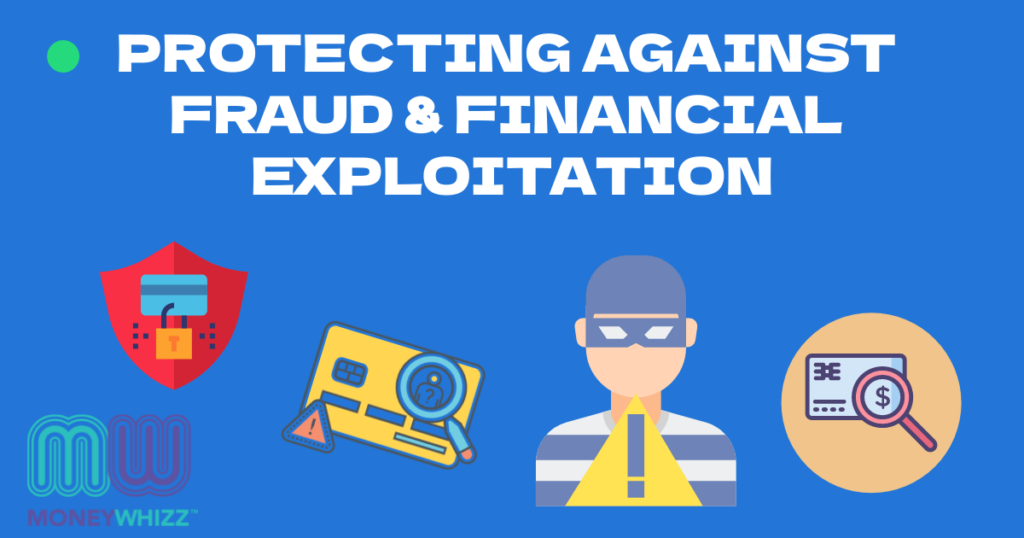Financial exploitation has been called “the crime of the 21st century” that is being committed by a broad spectrum of perpetrators. A key factor in some cases of elder financial exploitation is mild cognitive impairment which can diminish a person’s ability to make sound financial decisions.

This epidemic is under the radar. The cases tend to be very complex and can be difficult to investigate and prosecute. For example, elders who lose their life savings usually have little or no opportunity to regain what they have lost. Elder financial abuse can result in the loss of the ability to live independently; decline in health; broken trust, and fractured families.
Awareness is the first step to prevention of financial fraud
Awareness and prevention is the first step. Planning ahead for financial wellbeing and the possibility of diminished financial capacity is critical. Reporting and early intervention that results in loss prevention is imperative.
Examples of financial scams
- Exploitation by an agent under Power of Attorney or person in a fiduciary relationship
- Theft of money or property, often by a caregiver or in-home helper
- Investment fraud and scams, including deceptive “free-lunch seminars” selling unnecessary or fraudulent financial services or products
- Lottery and sweepstakes scams
- Scams by telemarketers, mail offers or door-to-door salespersons
- Computer and Internet scams
- Identity theft
- Contractor fraud and home improvement scams
Perpetrators of financial exploitation can be:
- Family members and caregivers
- Friends, neighbours or acquaintances
- Persons with Power of Attorney or the legal authority to access or manage your money
- Telephone and mail scammers
- Solicitors / advisers
- Internet scammers
- Home repair contractors
- Other persons known or unknown to the victim
Reasons people can be vulnerable include:
- Have regular income and accumulated assets (retirees)
- Be trusting and polite.
- Be lonely and socially isolated.
- Be vulnerable due to grief from the loss of a spouse, family member, friend, or pet
- Be reluctant to report exploitation by a family member, caregiver, or someone they depend on.
- Be dependent on support from a family member or caregiver to remain independent.
- Be receiving care from a person with substance abuse, gambling or financial problems, or mental health issues.
- Fear retaliation by the exploiter.
- Be unfamiliar with managing financial matters.
- Be unprepared for retirement and the potential loss of financial decision-making capacity.
- Have cognitive impairments that affect financial decision-making and judgment.
Reasons cases of fraud and financial exploitation can go unreported:
- Shame and embarrassment ̶ Many people are ashamed to admit that they have been financially exploited.
- Loyalty ̶ Reluctance to report a family member, caregiver or other person who may treat them well in other ways.
- Fear of retaliation, not being believed or losing their independence by being declared incompetent.
- Dependence on the abuser for care or assistance.
- Denial ̶ Some victims are unwilling or unable to acknowledge that financial exploitation is happening to them.
- Self-blame – Abuse can erode an older person’s self-esteem, and some victims may believe they deserve or have caused the abuse.
- Lack of awareness – Some victims are unaware that they are being exploited, or don’t know to whom they can report financial exploitation.
Areas to look out for include:
Power of Attorney (POA) or Fiduciary Abuse
- A person with legal authority to handle another person’s finances (also known as a fiduciary) may abuse that power.
A person who is named to manage your money or property is a fiduciary. He or she has a duty to manage your money/ property for your benefit.
- The person appointed as a fiduciary should be trustworthy and honest. Can be removed.
How to minimise the risk of abuse of a fiduciary:
- Trust, but verify. Only appoint someone you really trust and make sure they know your wishes and preferences. You can require in your POA that your agent regularly report to another person on the financial transactions he or she makes on your behalf.
- Avoid appointing a person who has substance abuse, gambling problems, or who mismanages money.
- Inform friends, family members, and financial advisers about your POA so they can look out for you.
- Tell your credit union / bank about the POA.
- Amend – Remember that POA designations are not written in stone – you can change them. Notify your financial institution if you do this.
- Avoid appointing hired caregivers or other paid helpers as your agent under Power of Attorney.
- Beware of someone who wants to help you out by handling your finances and be your new “best friend.” If an offer of help seems too good to be true, it probably is.
Other types of fraud include:
Email fraud – fake emails from companies that look real
Phone fraud – target potential pretending to be from a reputable company such as a bank, card issuer, utility company or a computer company. During the conversation or via text they will try to trick you into giving them personal, financial or security information or into making a money transfer.
Card / cheque fraud – due to the fact that some countries have not yet introduced “Chip and PIN”, Irish cards that are counterfeited can still be used to make fraudulent ATM withdrawals or pay for goods and services in some countries outside Europe.
- Treat your card like cash. Keep it safe at all times. A card with a PIN is a very valuable thing to a criminal. A card without a PIN is also of value to a criminal as it can be used in some online stores.
Online fraud – Online fraud is the use of the internet to defraud or take financial advantage of you. Fraudsters do this by accessing your online bank account or by presenting you with false offers in order to get you to transfer money or provide them with your card details
Advertising scams – Criminals can use false ads to trick you into transferring money, giving them your card details or other financial information. These ads can pop up while you’re browsing online, show up in a social network feed, be sent to you by email or post and appear in a newspaper or in a public place.
Remember!
- If it is too good to be true, it probably is
- Do your own research and be wary of wild claims
- Always seek independent financial and legal advice before making any investments
Check the various registers on the Central Bank of Ireland’s website - Use regulated investment firms where possible (Virtual assets are not currently regulated in Ireland)
- Do not respond to unsolicited approaches or cold-calls
- Don’t click on links for websites that you don’t know
- NEVER EVER disclose your bank account passwords or codes
- NEVER allow anyone remote access to your computer
Useful resources
- An Garda Siochana – www.garda.ie
- FraudSmart – https://www.fraudsmart.ie
- Your Financial Wellbeing – www.moneywhizz.org – get your financial wellbeing score


Comments are closed.